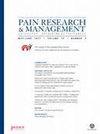Ultrasound-Guided Quadratus Lumborum Block Enhances the Quality of Recovery after Gastrointestinal Surgery: A Randomized Controlled Trial
IF 2.5
3区 医学
Q2 CLINICAL NEUROLOGY
引用次数: 3
Abstract
Background Quadratus lumborum block (QLB) has been used to reduce postoperative acute pain and opioid consumption. However, the efficacy of QLB on the quality of recovery (QoR) after gastrointestinal surgery has not been established. The aim of this study was to evaluate the ability of QLB to enhance the postoperative QoR in patients undergoing open gastrointestinal surgery. Methods Eighty-four patients undergoing open gastrointestinal surgery were randomized to receive ultrasound-guided QLB with either 20 ml of 0.375% ropivacaine or saline. The primary outcome was the QoR-15 score at 24 h after surgery. The secondary outcomes were the postoperative pain intensity, opioid consumption, the incidence of nausea, vomiting, and chronic pain. Results The global QoR-15 score at 24 h postoperatively was significantly higher in the QLB group than in the control group (mean difference: 16.9; 95% CI: 11.9–21.9). Additionally, the QoR-15 scores for five dimensions were significantly higher in the QLB group than in the control group. The cumulative oxycodone consumption was significantly lower in the QLB group during 0–6, 6–24, 0–24, 24–48, and 0–48 h postoperatively than in the control group. At rest or during coughing, the pain verbal rating scale scores were significantly lower at 1, 3, 6, 12, and 24 h after surgery in the QLB group than in the control group. The incidence of postoperative nausea was significantly different between the groups, but postoperative vomiting was not. Conclusion Single-injection posteromedial QLB with ropivacaine enhanced the QoR at 48 h after surgery and improved analgesia during the early postoperative period in patients undergoing gastrointestinal surgery.超声引导腰方肌阻滞提高胃肠道手术后恢复质量:一项随机对照试验
腰方肌阻滞(QLB)已被用于减少术后急性疼痛和阿片类药物的消耗。然而,QLB对胃肠道手术后恢复质量(QoR)的影响尚未确定。本研究的目的是评估QLB提高开放式胃肠手术患者术后QoR的能力。方法84例开腹手术患者随机接受超声引导下的QLB,分别给予0.375%罗哌卡因或生理盐水20 ml。主要观察指标为术后24小时QoR-15评分。次要结局是术后疼痛强度、阿片类药物用量、恶心、呕吐发生率和慢性疼痛。结果QLB组术后24 h QoR-15总分明显高于对照组(平均差值:16.9;95% ci: 11.9-21.9)。此外,QLB组五个维度的QoR-15得分显著高于对照组。QLB组术后0-6、6-24、0-24、24-48和0-48 h的累计氧可酮消耗量显著低于对照组。休息时或咳嗽时,QLB组术后1、3、6、12、24 h疼痛言语评定量表评分均显著低于对照组。两组术后恶心发生率差异有统计学意义,但术后呕吐发生率无统计学意义。结论单次注射后内侧QLB加罗哌卡因可提高胃肠道手术患者术后48 h的QoR,改善术后早期的镇痛效果。
本文章由计算机程序翻译,如有差异,请以英文原文为准。
求助全文
约1分钟内获得全文
求助全文
来源期刊

Pain Research & Management
CLINICAL NEUROLOGY-
CiteScore
5.30
自引率
0.00%
发文量
109
审稿时长
>12 weeks
期刊介绍:
Pain Research and Management is a peer-reviewed, Open Access journal that publishes original research articles, review articles, and clinical studies in all areas of pain management.
The most recent Impact Factor for Pain Research and Management is 1.685 according to the 2015 Journal Citation Reports released by Thomson Reuters in 2016.
 求助内容:
求助内容: 应助结果提醒方式:
应助结果提醒方式:


